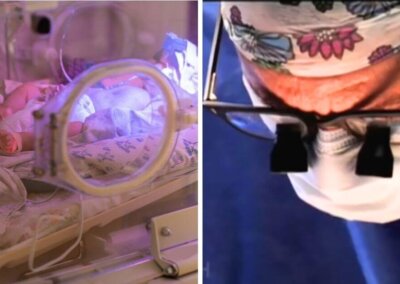Emergency responders from the East of England Ambulance Service (EEAST) have received recognition for saving the lives of a mother and premature baby in Chelmsford, Essex.
Paramedic Rachel Watts was the first to arrive at the scene after being assigned to the call by Chelmsford Emergency Operations Centre. She found a woman who had just given birth and a baby who was still in the amniotic sac. The baby’s size made it clear that he was very premature, and his mother was bleeding heavily.
Emergency medical technicians Henry Quick and Taylor Robinson arrived in an ambulance shortly afterwards and provided newborn life support for the baby.
Following the arrival of further support in the form of a senior paramedic and emergency medical technician, as well as an apprentice emergency medical technician, the baby was taken to the hospital emergency department. Later, the baby was transferred to a specialist unit for extremely pre-term babies. He is believed to have been born at 26 weeks gestation.
The baby’s mother was taken to the same local hospital in a second ambulance, and was able to be discharged a few days later.
Both mother and baby are doing well
EEAST CEO Tom Abell awarded commendations to the six staff members who attended the call.
He said “It was a privilege to present the CEO commendations and hear first-hand the team’s experiences of a very challenging and emotive job. Their remarkable actions led to an excellent outcome for baby and mother and they are well deserving of the commendations”.
Clinical lead for maternity at EEAST, Daimon Wheddon, said “The decision making and clinical management of mother and baby was exemplary and led to an excellent outcome. This is why the clinical team for maternity wanted all involved to receive CEO commendation as recognition”.
Medical advancements have led to an increased understanding of life before birth
By 24 weeks gestation, the current gestational limit for abortion, the baby has already been fully formed for 12 weeks.
At 12 weeks gestation (the most common abortion time limit among countries in the EU), the NHS outlines that the unborn baby is fully formed. All the organs, muscles, limbs and bones are in place, and the sex organs are well developed. From then on, the baby just has to grow and mature.
At around 15 weeks gestation, the unborn baby will start to hear – they may hear muted sounds from the outside world, as well as the sound of their mother’s voice and heart. At 16 weeks gestation, the muscles of the unborn baby’s face can now move and the beginnings of facial expressions appear.
At 18 weeks gestation, the unborn baby may respond to loud noises from the outside world, such as music. At 22 weeks gestation, the unborn baby is beginning to get into a pattern of sleeping and waking. At 23 weeks gestation, the unborn baby’s lungs are practising breathing movements to prepare for life outside the womb.
It is legal to abort a baby at any of the above stages of development, right through to 24 weeks gestation, under the current conditions set out in section 1(1)(a) of the Abortion Act. If the Gestational Time Limit Reduction amendment is successful, it will provide additional protection at least for babies towards the very end of the above gestational timeline.
Spokesperson for Right To Life UK, Catherine Robinson, said “This amazing story goes to show how crucial the swift actions of well-trained healthcare professionals are in saving the lives of newborn babies and their mothers. Hopefully the premature baby boy will continue to do well in hospital and be able to return home soon”.












